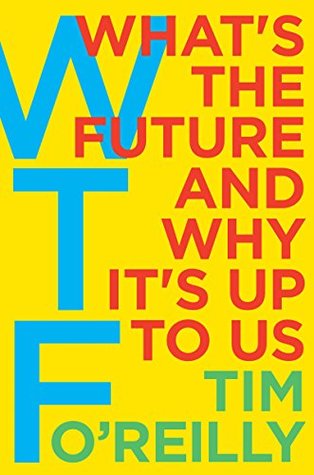More on this book
Community
Kindle Notes & Highlights
by
Tim O'Reilly
Read between
December 30, 2018 - January 13, 2019
Laura Baldwin, president and COO at O’Reilly Media, tells our customers, “You have to go to war with the army you have.”
The point of a disruptive technology is not the market or the competitors that it destroys. It is the new markets and the new possibilities that it creates.
1. WORK ON SOMETHING THAT MATTERS TO YOU MORE THAN MONEY.
Remember that financial success is not the only goal or the only measure of achievement. It’s easy to get caught up in the heady buzz of making money. You should regard money as fuel for what you really want to do, not as a goal in and of itself.
Money is like gas in the car—you need to pay attention or you’ll end up on the side of the road—but a successful business or a well-lived life is not a tour of gas stations.
Nick Hanauer likes to say, “Solve the biggest problem you can.” Pursue something so important that even if you fail, the world is better off for you having tried.
“What we fight with is so small, and when we win, it makes us small. What we want is to be defeated, decisively, by successively greater beings.”
CREATE MORE VALUE THAN YOU CAPTURE.
If you’re succeeding at the goal of creating more value than you capture, you may sometimes find that others have made more of your ideas than you have yourself. It’s okay.
Focusing on solving big problems rather than on making money, and focusing on creating more value than you capture, are closely related principles.
ASPIRE TO BE BETTER TOMORROW THAN YOU ARE TODAY.
I’ve always loved the judgment of Kurt Vonnegut’s novel Mother Night: “We are what we pretend to be, so we must be careful about what we pretend to be.”
Bill Gates once wrote, “We always overestimate the change that will occur in the next two years and underestimate the change that will occur in the next ten.
Climate change provides us with a modern version of Pascal’s Wager (the argument of the seventeenth-century philosopher and mathematician for acting as though you believe in God even if you don’t). If catastrophic global warming turns out not to happen, the steps we’d take to address it are still worthwhile.
Whether you’re in business or public policy, don’t settle for rehashing tired solutions. Keep looking for that positive astonishment that means you’ve accomplished something wonderful for the people you serve. Jeff continued: “Staying in Day 1 requires you to experiment patiently, accept failures, plant seeds, protect saplings, and double down when you see customer delight.” Regarding “resisting proxies,” Jeff noted
that one of the traps that leads to Day 2 is that “you stop looking at outcomes and just make sure you’re doing the process right.”
We can’t just accept whatever results we get from following old rules; we must constantly measure our actions against their results. And when we see that the results don’t measure up to our dreams, we must rewrite the rules. Jeff also urged his employees to embrace powerful trends in technology and the economy: “If you fi...
This highlight has been truncated due to consecutive passage length restrictions.
First, never use a one-size-fits-all decision-making process. Many decisions are reversible, two-way doors. Those decisions can use a light-weight process. For those, so what if you’re wrong? . . . Second, most decisions should probably be made with somewhere around 70% of the information you wish you had. If you wait for 90%, in most cases, you’re probably being slow. Plus, either way, you need to be good at quickly recognizing and correcting bad decisions. If you’re good at course correcting, being wrong may be less costly than you think, whereas being slow is going to be expensive for sure.
...more
Even without doing a scenario-planning exercise, asking yourself “What happens if this goes on?” is a great way to prepare for the future—and to spot entrepreneurial opportunities.


